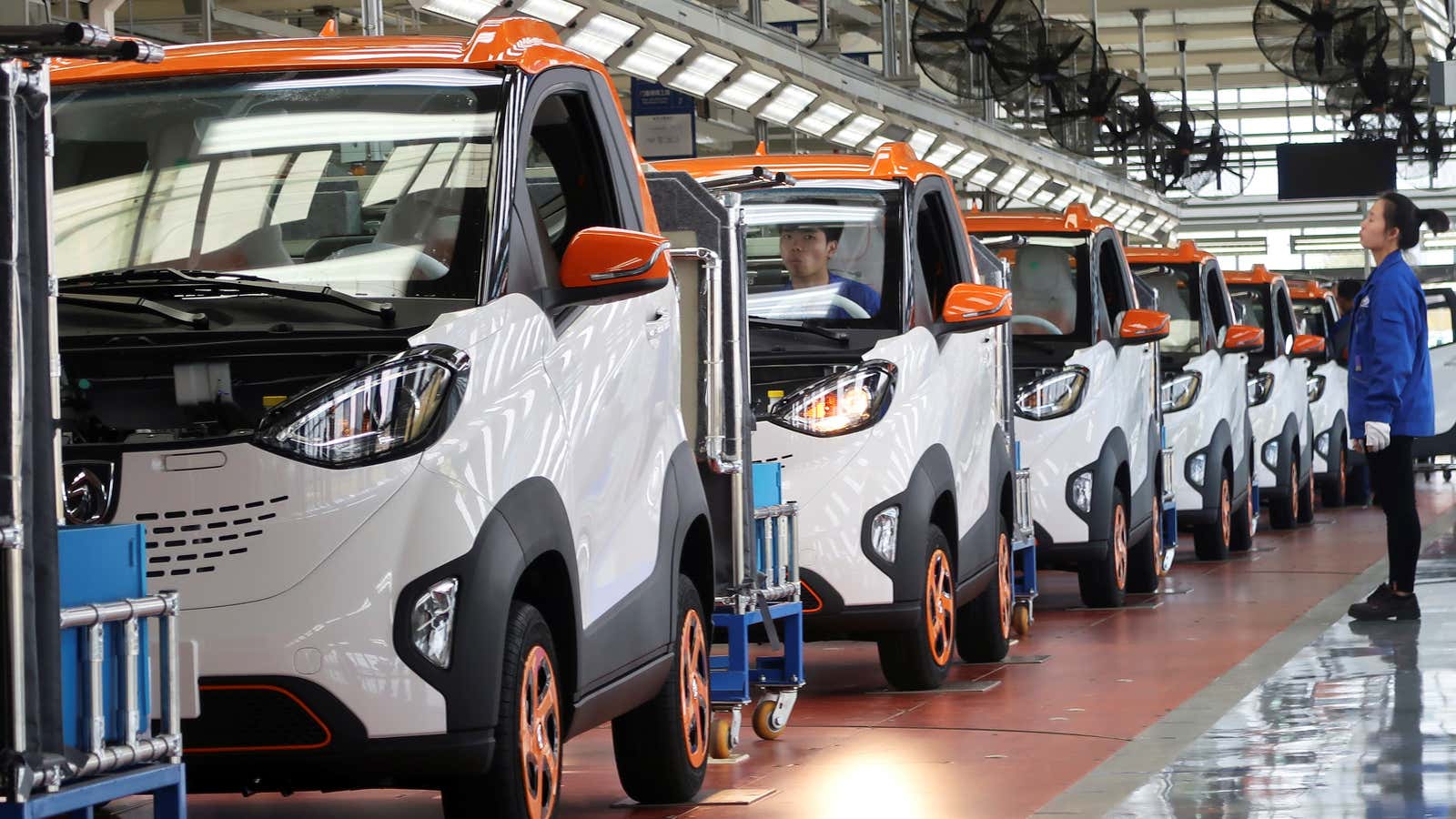Want to become an instant expert at all things electric vehicles in China? As a preview of Quartz’s membership premium content, here are five big takeaways from our recent deep dive into the subject:
China is the future of electric cars
In 2018, more electric cars were sold in China than in the rest of the world combined. The Chinese government has spent nearly $60 billion in the last decade to create an industry that builds electric cars, while also reducing the number of licenses available for gasoline-powered cars to increase demand for electric cars. And Beijing plans to spend just as much over the next decade.
No other country in the world has made anywhere near as big an investment or instituted as significant regulations. But then again, no country has the same potential payoff as China. If its bet succeeds, China can look forward to cleaner air, lower reliance on imported oil, and being a technology leader in a new high-tech industry.
Read more: Beyond the Tesla bubble: The future of electric cars is being scripted in China
It all started with electric two-wheelers
China has 99% of the world’s 250 million electric two-wheelers. That’s nearly 100 times the total number of electric passenger cars in the world. Starting in 1999, Beijing designated electric two-wheelers that can’t go faster than 20 km per hour (12 mph) as “bicycles.” That meant they could be used without a license or registration and ridden in bicycle lanes. Next, it restricted the ownership of gasoline-powered two-wheelers in the central parts of cities.
The country is now applying what it learned with two-wheelers to accelerate the electrification of four-wheelers. Fun fact: Today, electric two-wheelers are so common in China that they account for 80% of all the greenhouse-gas emissions avoided by the use of electric vehicles—in the entire world.
Read more: To master electric-car manufacturing, China started with bikes
China has the supply chain sorted
China now has more than 100 electric-car makers, along with hundreds of additional companies that supply components for electric cars.
The most crucial and expensive of these components is the battery, and China now has a tight grip on the global supply of the elements needed to manufacture them. Batteries are made up of four components: anode, cathode, separator, and electrolyte. China currently controls between 50% and 77% of the global market for the raw materials of these components, according to Yano Research Institute.
Read more: Electric cars claim to be cheaper and greener. But are they?
Electric buses are becoming a no-brainer
The total cost of owning an electric bus—which is to say its upfront price along with its lifetime fuel and maintenance costs—is already lower than that of gasoline-powered buses in much of the world. They’ll be cheaper in all of the world within the next three years, according to Bloomberg New Energy Finance.
That makes sense. Electric vehicles are much more efficient, which means they require less energy to move the same distance than a gasoline-powered car. On top of that, for each unit of energy, electricity is almost always cheaper than gasoline. Thus, the more an electric vehicle runs for the cheaper it becomes. That makes fleet vehicles, like buses and taxis, the best candidates for buying electric versions. China currently makes 99% of the world’s electric buses, and experts say it’s unlikely other countries will catch up anytime soon.
Read more: Inside BYD—the world’s largest maker of electric vehicles
Autonomy is coming. Could China lead?
In 2018, the Chinese government’s top economic-policy agency set a goal to have half the new cars on China’s roads be partially or fully autonomous by the end of 2020. China’s technology and manufacturing capabilities still have a ways to go before that goal becomes realistic. Currently, the US leads the self-driving-car industry, thanks to its swarms of software engineers in Silicon Valley. But China’s goal makes sense. If done right, a fleet of fully autonomous electric cars that large could be one of the most resource-efficient systems of transport the modern world has seen.
